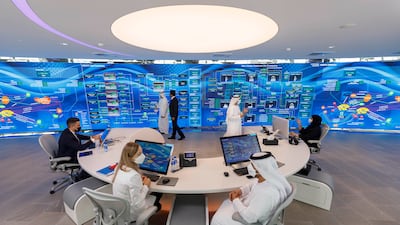Abu Dhabi National Oil Company has relied on artificial intelligence and behavioural science to keep workers safe since the start of the pandemic.
But those spearheading Adnoc’s preparations for a post-pandemic era say greater “resilience” and “agility” are the ultimate payoff after more than a year of hybrid working.
"We were very agile in our approach and this is thanks to our leadership being very candid, open to new suggestions and not shying away from trying things out for the first time," Ali Alshehhi, a manager in the business and operations analytics department, told The National.
Like many companies around the world, Adnoc employees are coming back to the office in phases. For the Abu Dhabi oil company, the transition began in June 2020. Today, about 60 per cent of workers are back in the office, and the company is taking stock of lessons learnt and may carry forward to strengthen its culture in a post-Covid era.
Panorama, a digital command centre that opened in late 2017 at Adnoc’s headquarters, can now be accessed remotely by employees through a secure connection, providing real-time information across the company’s 14 subsidiary and joint venture companies, using artificial intelligence and data analysis to anticipate disruption and optimise production.
During the pandemic, it has fed data directly into the company's crisis management hub, helping to predict, track and model Covid-19 infection and recovery progress within its workforce. The hub provides simulations and scenario planning for health and safety measures at site level and offers real-time business optimisation amid ever-changing scenarios.
"When the Covid-19 business started March of last year, we had eight days' worth of data. And using [that] ... we made a projection of how the future curve will look for infections," Mr Alshehhi said.
With the help of AI, his team was able to predict the peak of infections, in mid-June of last year, within three days' accuracy. Since then, Panorama has modelled more than 2,000 simulations to improve business continuity.
Adnoc leadership also recognised early on that communication during the pandemic had to go beyond basic information about health and safety and instead keep employees connected and engaged. The intent was to help employees manage the stress and anxiety related to the unexpected nature of the pandemic, and not merely get through it.
Adnoc achieved that goal by placing emphasis on transparent communication across different channels. This encompassed everything from daily and weekly emails to ‘what you need to know’ content for the intranet to encourage healthy habits and behaviour, especially in the early days of the coronavirus.
Adnoc also introduced an AI-driven chatbot app to help employees find answers to their questions and keep up with the pace of changing policies and news. The communications team created WhatsApp animations in five languages to explain policies simply and visually for hygiene and social distancing.
Managers also encouraged virtual mobile phone tours by returning employees to help demystify the return-to-the-office process, build connection and foster a sense of excitement for those who were returning in later waves.
manager at Adnoc's business and operations analytics department
Scattered throughout Adnoc HQ are “nudges” – a form of behavioural neuroeconomics – to encourage Covid-safe behaviour for employees already back in the office through targeted messaging and visuals.
Recognising that employees are returning in phases and are therefore in different stages of transition and emotional states, Adnoc's leadership has been regularly surveying staff to understand and gauge their emotional response.
This provides an opportunity for employees to express themselves and be heard, and helps the organisation to continue to strengthen its culture in a post-Covid era, said Coni Judge, a senior adviser on culture and employee engagement.
"We look at this as an opportunity [rather] than something bad that happened to us. As a result, we're looking at how to do things better and faster and cheaper," Mr Alshehhi said. "Come what may, I think our appetite now is larger to discover new ways of doing business."


